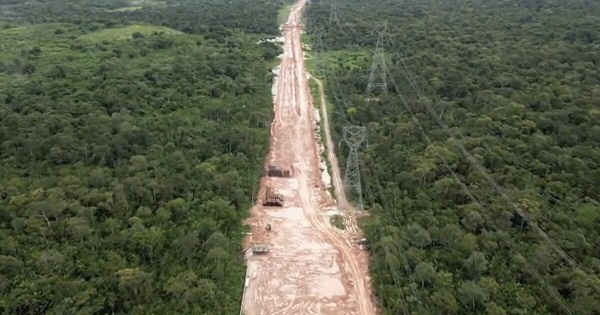Daily Caller
Amazon Rainforest Razed To Build Highway For UN Climate Summit


From the Daily Caller News Foundation
By
Ahead of the COP30 climate summit in Belém, Brazil, developers are carving a four-lane highway through protected tracts of the Amazon rainforest to ease travel for attendees.
The highway, one of several infrastructure projects fast-tracked for the summit, is meant to ease congestion for the more than 50,000 attendees expected in November. The state government insists the road is a “sustainable” development with wildlife crossings, bike lanes and solar lighting, but local critics argue it contradicts the very mission of the climate conference, according to the BBC.
“Everything was destroyed,” Claudio Verequete, a local resident whose family depended on the açaí trees that once stood where the road now cuts through the forest, told the BBC. “Our harvest has already been cut down. We no longer have that income to support our family.”
Dear Readers:
As a nonprofit, we are dependent on the generosity of our readers.
Please consider making a small donation of any amount here.
Thank you!
The highway, known as Avenida Liberdade, had been shelved multiple times in the past due to environmental concerns but was revived as part of a broader push to modernize Belém ahead of COP30, according to the outlet. State officials say the city’s transformation will leave a lasting legacy, including an expanded airport, new hotels and an ungraded port to accommodate cruise ships.
Adler Silveira, the Brazilian state of Pará’s infrastructure secretary, defended the highway project in a statement to the BBC, calling it an “important mobility intervention” that will benefit the local population long after the summit ends.
Satellite images of the area appear to show miles of cleared land where dense rainforest once stood. Conservationists warn that beyond immediate deforestation, the road could enable further illegal logging and land speculation, fragmenting ecosystems critical to carbon absorption, the BBC reported.
“From the moment of deforestation, there is a loss,” Silvia Sardinha, a wildlife veterinarian at a university near the site of the new highway, told the BBC. “Land animals will no longer be able to cross to the other side, reducing the areas where they can live and breed.”
The annual UN Climate Change Conference gathers world leaders, lawmakers, scientists and industry representatives to negotiate global climate policy. Discussions typically center around greenhouse gas emissions, phasing out fossil fuel, adapting industries to climate benchmarks and enforcing international agreements like the Paris Accord, as well as topics like deforestation. At previous summits, speakers have advocated for policies such as taxing meat products and naming extreme heat events to create greater awareness of temperature changes. Taliban officials from Afghanistan also attended the COP29 in 2024, as UN agencies reportedly considered unlocking funds for the nation to combat climate crises. The COP28 the year prior included a discussion on sustainable yachting.
The Amazon rainforest, previously called the “lungs of the Earth,” now reportedly emits more carbon dioxide than it absorbs due to rampant deforestation, according to the National Oceanic and Atmospheric Administration.
Attendees of the 2025 climate summit are expected to include representatives from nearly every UN member state, as well as corporate leaders in the renewable energy industry such as Siemens Gamesa.
Luiz Inácio Lula da Silva, Brazil’s president, remarked that “it’s a COP in the Amazon, not a COP about the Amazon,” adding the conference will be “historic and a landmark” in a February press release. The COP30 summit is scheduled for Nov. 10 through Nov. 21.
Daily Caller
McKinsey outlook for 2025 sharply adjusts prior projections, predicting fossil fuels will dominate well after 2050


From the Daily Caller News Foundation
A new report from McKinsey & Company, the “Global Energy Perspective,” lays bare what many of us – dismissed as “climate deniers” – have been asserting all along: Coal, oil and natural gas will continue to be the dominant sources of global energy well past 2050.
The McKinsey outlook for 2025 sharply adjusts prior projections. Last year, the management consultant’s models had coal demand falling 40% by 2035. Today, McKinsey projects an uptick of 1% over the same period. The dramatic reversal is driven by record commissioning of coal-fired power plants in China, unexpected increases in global electricity use, and the lack of viable alternatives for industries like steel, chemicals and heavy manufacturing.
The report states that the three fossil fuels will still supply up to 55% of global energy in 2050, a forecast that looks low to me. Today’s share for hydrocarbons is about 64%.
Dear Readers:
As a nonprofit, we are dependent on the generosity of our readers.
Please consider making a small donation of any amount here.
Thank you!
In any case, McKinsey’s report confirms what seasoned energy analysts and pragmatic policymakers have long maintained: The energy transition will not be swift, simple, or governed solely by climate targets. In fact, this energy transition will not happen at all without large scale deployment of nuclear, geothermal or other technological innovations that prove practical.
In places such as India, Southeast Asia and sub-Saharan Africa, the top energy priorities are access, affordability and reliability, which together add up to national security. Planners are acutely aware of a trap: Sole reliance on weather-dependent power risks blackouts, industrial disruption, economic decline and civil unrest.
That is why many developing nations are embracing a dual track: continued investment in conventional generation (coal, gas, nuclear) while developing alternative technologies. McKinsey says this in consultancy lingo: “Countries and regions will follow distinct trajectories based on local economic conditions, resource endowment, and the realities facing particular industries.”
In countries like India, Indonesia and Nigeria, the scale of electrification and industrial expansion is enormous. These countries cannot afford to wait decades for perfect solutions. They need “reliable and good enough for now.” That means conventional fuels will be retained.
McKinsey’s analysis also underscores what physics and engineering dictate: Intermittent and weather-dependent sources, such as wind and solar, require vast land areas, backup batteries and generation and power-grid investments, none of which come cheaply nor quickly.
The technologies of wind and solar branded as renewable should instead be called economy killers. They make for expensive and unstable electrical systems that have brought energy-rich nations like Germany to their knees. After spending billions of dollars on unreliable wind turbines and solar panels and demolishing nuclear plants and coal plants, the country is struggling with high prices and economic stagnation.
The Germans now have a word for their self-inflicted crisis: Dunkelflaute. It means “dark doldrums”—a period of cold, sunless, windless days when their “green” grid fails. During a Dunkelflaute in November 2024, fossil fuels were called on to provide 70% of Germany’s electricity.
If “renewables” were truly capable, planners would shut down fossil fuel generation. But that is not the case. While wind and solar are pursued in some places, coal and natural gas remain much sought-after fuels. In the first half of 2025 alone, China commissioned about 21 gigawatts (GW) of new coal-fired capacity, which is more than any other country and the largest increase since 2016.
Further, China has approved construction of 25 GW of new coal plants in the first half of 2025. As of July, China’s mainland has nearly 1,200 coal plants, far outstripping the rest of the world.
McKinsey points to a dramatic surge in electricity demand driven by data centers, which is estimated to be about 17 % annually from 2022 to 2030 in the 38 OECD countries. This kind of growth in electricity use simply cannot be met by wind and solar.
When analysts, journalists and engineers point out these realities, they’re branded as “shills” for the fossil fuel industry. However, it is not public relations to point out the physics and economics that make up the math for meeting the world’s energy needs. Dismissing such facts is to deny that reliable energy remains the bedrock of modern civilization.
The cost of foolish “green” policies is being paid in lost jobs, ruined businesses, disrupted lives and impoverishment that could have been avoided by wiser choices.
For those who have repeated energy realities for years, the vindication is bittersweet. The satisfaction of being right is tempered by the knowledge that many have suffered because reality has been ignored.
Vijay Jayaraj is a Science and Research Associate at the CO2 Coalition, Fairfax, Va. He holds an M.S. in environmental sciences from the University of East Anglia and a postgraduate degree in energy management from Robert Gordon University, both in the U.K., and a bachelor’s in engineering from Anna University, India.
Censorship Industrial Complex
School Cannot Force Students To Use Preferred Pronouns, US Federal Court Rules


From the Daily Caller News Foundation
“Our system forbids public schools from becoming ‘enclaves of totalitarianism.’”
A federal appeals court in Ohio ruled Thursday that students cannot be forced to use preferred pronouns in school.
Defending Education (DE) filed the suit against Olentangy Local School District (OLSD) in 2023, arguing the district’s anti-harassment policy that requires students to use the “preferred pronouns” of others violates students’ First Amendment rights by “compelling students to affirm beliefs about sex and gender that are contrary to their own deeply held beliefs.” Although a lower court attempted to shoot down the challenge, the appeals court ruled in a 10-7 decision that the school cannot “wield their authority to compel speech or demand silence from citizens who disagree with the regulators’ politically controversial preferred new form of grammar.”
Because the school considers transgender students to be a protected class, students who violated the anti-harassment policy by referring to such students by their biological sex risked punishments such as suspension and expulsion, according to DE.
Dear Readers:
As a nonprofit, we are dependent on the generosity of our readers.
Please consider making a small donation of any amount here.
Thank you!
“American history and tradition uphold the majority’s decision to strike down the school’s pronoun policy,” the court wrote in its opinion. “Over hundreds of years, grammar has developed in America without governmental interference. Consistent with our historical tradition and our cherished First Amendment, the pronoun debate must be won through individual persuasion, not government coercion. Our system forbids public schools from becoming ‘enclaves of totalitarianism.’”
OLSD did not respond to the Daily Caller News Foundation’s request for comment.
“We are deeply gratified by the Sixth Circuit’s intensive analysis not only of our case but the state of student First Amendment rights in the modern era,” Nicole Neily, founder and president of DE, said in a statement. “The court’s decision – and its many concurrences – articulate the importance of free speech, the limits and perils of public schools claiming to act in loco parentis, and the critical role of persuasion – rather than coercion – in America’s public square.”
“Despite its ham-fisted attempt to moot the case, Olentangy School District was sternly reminded by the 6th circuit en banc court that it cannot force students to express a viewpoint on gender identity with which they disagree, nor extend its reach beyond the schoolhouse threshold into matters better suited to an exercise of parental authority,” Sarah Parshall Perry, vice president and legal fellow at DE, said in a statement. “A resounding victory for student speech and parental rights was long overdue for families in the school district and we are thrilled the court’s ruling will benefit others seeking to vindicate their rights in the classroom and beyond.”
-

 Business17 hours ago
Business17 hours agoCBC cashes in on Carney as the news industry playing field tilts further in its favour, crippling the competition
-

 Energy2 days ago
Energy2 days agoThawing the freeze on oil and gas development in Treaty 8 territory
-

 Business2 days ago
Business2 days agoWhat Pelosi “earned” after 37 years in power will shock you
-

 Agriculture9 hours ago
Agriculture9 hours agoFarmers Take The Hit While Biofuel Companies Cash In
-

 Business2 days ago
Business2 days agoOttawa should stop using misleading debt measure to justify deficits
-

 Agriculture18 hours ago
Agriculture18 hours agoThe Canadian Food Inspection Agency’s Bloodlust for Ostriches: Part 2
-

 International2 days ago
International2 days agoBBC uses ‘neutrality’ excuse to rebuke newscaster who objected to gender ideology
-

 International2 days ago
International2 days agoLarge US naval presence in Caribbean reveals increased interest in western security


